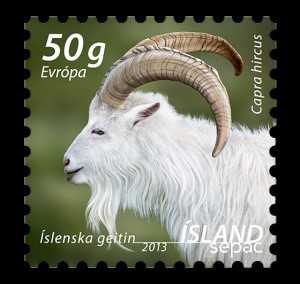 While the early settlers brought goats to Iceland there are no records of them being brought to this country after the settlement. Thus, all Icelandic goats trace their ancestry to the settlement breed.
Place names connected to goats indicate a substantial number of them in the early settlement period. However, in the eighteenth century the goat population had decreased to only about 800 animals, the reduction being attributed to climatic cooling in the 16th and 17th century. Sheep products were much better suited to such a climate. In the great depression of the thirties the number of goats in Iceland increased because they were well suited as domesticated animals in fishery villages. In 1930 the population numbered about 3000 animals. They were finally banned in villages and the stock decreased rapidly after 1940. In 1963 there were only 87 goats in the country and the species was added to the list of endangered animals. In 2008 the government signed the international convention on biological diversity which also covers the Icelandic settlement goat. The goat population must exceed 1000 animals to be removed from the endangered list and has still a long way to go.
While the early settlers brought goats to Iceland there are no records of them being brought to this country after the settlement. Thus, all Icelandic goats trace their ancestry to the settlement breed.
Place names connected to goats indicate a substantial number of them in the early settlement period. However, in the eighteenth century the goat population had decreased to only about 800 animals, the reduction being attributed to climatic cooling in the 16th and 17th century. Sheep products were much better suited to such a climate. In the great depression of the thirties the number of goats in Iceland increased because they were well suited as domesticated animals in fishery villages. In 1930 the population numbered about 3000 animals. They were finally banned in villages and the stock decreased rapidly after 1940. In 1963 there were only 87 goats in the country and the species was added to the list of endangered animals. In 2008 the government signed the international convention on biological diversity which also covers the Icelandic settlement goat. The goat population must exceed 1000 animals to be removed from the endangered list and has still a long way to go.
Current members
Iceland – SEPAC The Icelandic Settlement Goat
 While the early settlers brought goats to Iceland there are no records of them being brought to this country after the settlement. Thus, all Icelandic goats trace their ancestry to the settlement breed.
Place names connected to goats indicate a substantial number of them in the early settlement period. However, in the eighteenth century the goat population had decreased to only about 800 animals, the reduction being attributed to climatic cooling in the 16th and 17th century. Sheep products were much better suited to such a climate. In the great depression of the thirties the number of goats in Iceland increased because they were well suited as domesticated animals in fishery villages. In 1930 the population numbered about 3000 animals. They were finally banned in villages and the stock decreased rapidly after 1940. In 1963 there were only 87 goats in the country and the species was added to the list of endangered animals. In 2008 the government signed the international convention on biological diversity which also covers the Icelandic settlement goat. The goat population must exceed 1000 animals to be removed from the endangered list and has still a long way to go.
While the early settlers brought goats to Iceland there are no records of them being brought to this country after the settlement. Thus, all Icelandic goats trace their ancestry to the settlement breed.
Place names connected to goats indicate a substantial number of them in the early settlement period. However, in the eighteenth century the goat population had decreased to only about 800 animals, the reduction being attributed to climatic cooling in the 16th and 17th century. Sheep products were much better suited to such a climate. In the great depression of the thirties the number of goats in Iceland increased because they were well suited as domesticated animals in fishery villages. In 1930 the population numbered about 3000 animals. They were finally banned in villages and the stock decreased rapidly after 1940. In 1963 there were only 87 goats in the country and the species was added to the list of endangered animals. In 2008 the government signed the international convention on biological diversity which also covers the Icelandic settlement goat. The goat population must exceed 1000 animals to be removed from the endangered list and has still a long way to go.

 Åland
Åland  Faroe Islands
Faroe Islands  Gibraltar
Gibraltar  Greenland
Greenland  Guernsey
Guernsey  Isle of Man
Isle of Man  Jersey
Jersey  Liechtenstein
Liechtenstein  Luxembourg
Luxembourg  Malta
Malta  Monaco
Monaco  Vatican City
Vatican City 